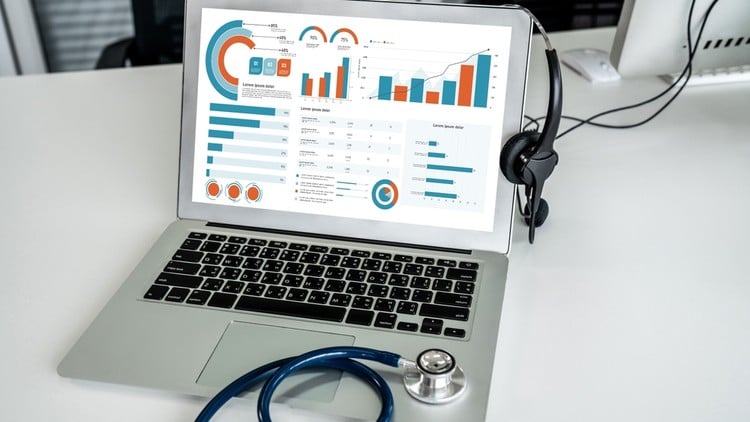
Master Health Data & EHR: Healthcare IT, HL7/FHIR Interoperability, Medical Records Management, Telehealth & Analytics
⏱️ Length: 3.3 total hours
👥 80 students
Add-On Information:
Note➛ Make sure your 𝐔𝐝𝐞𝐦𝐲 cart has only this course you're going to enroll it now, Remove all other courses from the 𝐔𝐝𝐞𝐦𝐲 cart before Enrolling!
-
Course Overview
- Provides an accessible gateway into health data and Electronic Health Records (EHR) for all beginners.
- Introduces how patient information is digitally managed, secured, and utilized in modern healthcare.
- Explores the transformative shift from paper records to sophisticated digital healthcare ecosystems.
- Gains a strategic overview of healthcare IT’s critical role in enhancing patient safety and care quality.
- Highlights the paramount importance of data integrity, accuracy, and timely access in clinical settings.
- Uncovers core architectural principles governing health information systems and their operational impact.
- Illustrates how digital innovation within EHRs reshapes patient engagement and overall care delivery.
- This module navigates essential terminologies, foundational technologies, and key regulatory frameworks for newcomers.
-
Requirements / Prerequisites
- Basic Computer Literacy: Comfort with general computer operations and proficient web browsing.
- Interest in Healthcare Technology: A genuine curiosity about medical practice intersecting with digital innovation.
- No Prior Health IT Experience: Designed for absolute beginners, assuming no prior EHR or medical coding knowledge.
- Reliable Internet Connectivity: Essential for seamless access to all course materials and online resources.
- Standard Computing Device: A laptop or desktop with a modern web browser for optimal learning.
-
Skills Covered / Tools Used
- Conceptual EHR Navigation: Understand typical EHR interfaces, user roles, and real-world operational workflows.
- Healthcare Jargon Interpretation: Learn to apply industry-specific terms for clinical documentation and administrative tasks.
- Data Flow Visualization: Master mapping patient information journeys across diverse healthcare touchpoints.
- Foundational Interoperability: Grasp the strategic importance of data exchange standards like HL7 and FHIR.
- HIPAA and Security Principles: Cultivate awareness of regulations and best practices for protecting sensitive patient data.
- Medical Billing Linkage: Connect EHR clinical actions to their impact on the revenue cycle and claims processes.
- Data Governance Insight: Recognize the critical necessity of data quality for accurate health informatics.
- Healthcare KPI Recognition: Identify key performance indicators for monitoring organizational health and patient outcomes.
- Telehealth Integration: Comprehend how EHRs effectively facilitate and support modern virtual care models.
-
Benefits / Outcomes
- Health Informatics Entry: Build solid foundational knowledge for various entry-level health information management roles.
- Confident IT Engagement: Gain the ability to contribute meaningfully to healthcare technology discussions.
- Enhanced Professional Standing: Demonstrate a forward-looking understanding of modern healthcare’s digital imperatives.
- Clearer System Comprehension: Unravel the complex interplay of clinical, administrative, and financial functions.
- Future-Proofed Learning: Acquire vital knowledge for a rapidly evolving, digitally driven healthcare industry.
- Bridging Clinical & IT: Equip clinicians with IT context; provide IT professionals with clinical relevance.
- Innovation Recognition: Identify how robust data management fuels advancements in patient care and research.
- Data Stewardship Basis: Establish fundamental principles for responsible patient data management.
-
PROS
- Ultimate Beginner-Friendliness: Expertly tailored for learners with zero prior healthcare IT background.
- Comprehensive Foundational Scope: Delivers a broad yet focused introduction to core health data concepts.
- High Industry Relevance: Addresses critical skill demands in the rapidly digitalizing healthcare sector.
- Efficient Learning Curve: Provides substantial foundational knowledge within a concise 3.3-hour duration.
- Simplifies Complexity: Makes intricate topics like interoperability and regulations highly accessible.
-
CONS
- No Hands-On Software: Offers conceptual understanding of EHRs, not practical proficiency with particular vendor systems.
Learning Tracks: English,IT & Software,Other IT & Software
Found It Free? Share It Fast!